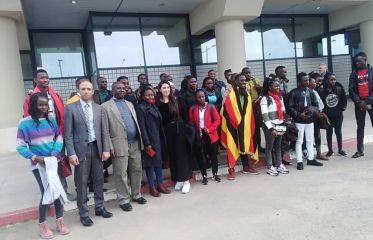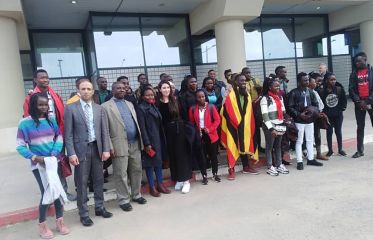Breaking News
- Flexible Remote Work Opportunity for University Students: Earn $100–$250 Per Month ...Read More
- Ministry of Education and Sports Azerbaijan Government Scholarships For 2025-2026 Academic Year ...Read More
- Government Sponsorship Undergraduate Admission Lists 2025-26 for Makerere University ...Read More
- Ministry of Education And Sports: Egyptian Government Scholarships 2025-2026 Academic Year ...Read More
- Ground Breaker Full Scholarship for girls to study Software Engineering 2025 July Intake ...Read More
- Tony Elumelu Foundation Entrepreneurship Programme (TEEP) 2025 for young African Entrepreneurs ...Read More
- DESIGNING FUTURES 2050 International Design Competition 2025 (€15,000 prize) ...Read More
- Ground Breaker Full time Scholarship for girls to study Software Engineering 2025 Intake ...Read More
- Ministry of Education And Sports Algerian Vocational Training Scholarships for 2024-2025 AY ...Read More
- Ministry of Education and Sports Advert for the Algerian Government Scholarships for 2024-2025 ...Read More
The majority of livestock farm production units in Uganda are characterized by low output per animal and unit area, slow growth rates and small-sized mature animals. The units are mainly in or near urban areas and use compounded animal feeds to supplement rations. Animal feeds account for 70% of production costs, thereby having a great impact on the farmers' total production costs and profits.
Small-scale dairy, poultry and piggery farms are a source of livelihood to the poor and they also play a vital role in ensuring increased supplies of milk, meat and eggs to the urban populations. However, the production level on these farms is hindered by dependency on a limited number of feed ingredient sources, lack of skilled manpower, limited access to credit facilities, lack of information, knowledge and skills concerning good manufacturing practice in the production of animal feeds, and lack of basic training in animal nutrition and feed milling technology. This has led to poor quality feeds on the market, further leading to low livestock and poultry production in Uganda.
Objective:
To drive transformative skills, knowledge, technology, innovation, SMEs (Small-Medium Enterprises) and services into the meat industry and in partnerships, continuously improve production, health, employment, community well-being and economic growth.
The specific objectives of this programme are;
- To provide students with a basic training in animal nutrition, application of feed ingredients and concentrates for animals, aquaculture species and their nutritional consequences.
- To impart hands-on experience (practical) with the various types of equipment used in feed production and value addition.
- To produce skilled graduates who are job creators in feeds related enterprises.
Source * https://www.afrisa.org/Feeds.html
Essential
Two best done of Chemistry, Biology, Agriculture, Foods and nutrition, Physics, Mathematics and Geography, Economics, Entrepreneurship
Relevant
One best done of Chemistry, Biology, Agriculture, Foods and nutrition, Physics, Mathematics and Geography, Economics, Entrepreneurship
Desirable
General paper Sub Mathematics or Computer studies
Source * https://www.afrisa.org/Weighting_System_for_Degree_Programmes.html
Subjects for Admission
| Item | Fees |
|---|
Hear and learn from those that did the course and what they have been able to do with the knowledge they acquired
This programme offers work opportunities as one or more of the following;
- Feed ingredient specialist
- Feed production equipment and machinary operator
- Feed production equipment and machinery maintenance technician
- Feeding equipment designers and constructor
- Feed quality control technician
- Feed marketing officer
- On-farm feed production and feeding advisor
- Feed compounding and mixing technician
- Animal feed type specialist
Source * https://www.afrisa.org/Feeds.html
Other Courses Currently Admitting
-
Diploma in Counselling
Nkumba University
-
Diploma in Procurement and Logistics
Web Info-net institute of Technology
-
Diploma in Business Management
Mountain of the Moon University
-
Diploma in Land Management and Valuation
Institute of Survey and Land Management
-
Bachelor of Science in Population Studies
Ndejje University
Did this page help you? Yes No Share Feedback
































